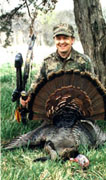My first bit of advice is to continue
hunting in all weather conditions except during life-threatening thunder storms.
Turkeys will continue to
follow daily patterns on windy or rainy days.
On a windy day, take a position on the lee
side of a ridge where you can hear well and where your calling can be heard.
Protected areas like this are where turkeys
may go especially if good Strut
Zones are present. Since you may have only a few days to hunt in the
spring, you should take advantage of every available day.
Keep in mind that a bad day
hunting is always better than the best day working!
|
If it's raining, go
to a roost area early--about an hour before sunrise.
You'll be able to move quietly and get closer
to roosted birds than on a quiet, dry day. It's often easy to get within 60 yards of
a gobbler in these conditions.
When it thunders, listen for a responding
gobble from a roosted tom. They will often gobble well to thunder claps. This
allows you to move into position without attracting attention.
|
During heavy rain, turkeys usually stay on
roost longer, but will eventually fly down and go about their daily activities.
Open fields and very
open woods are often places turkeys go when it's raining or snowing. They appear to
dislike the wet, dripping underbrush of the woods when it's raining.
If you encounter a
gobbler that won't leave the roost during bad weather, just stay with him until he does
fly down---it may be an hour or more of waiting.
During your wait, try a few quiet calls like
tree yelps, clucks, or soft plain yelps to let him know you are still there. You're
trying to sound like another roosted turkey. Occasionally, you might try a fly-down
cackle to let him know that "the hen" has flown down.
Be patient.
|
On windy days, which
is a turkey hunter's worst weather condition, find a sheltered valley, or the lee side of
a ridge to set up.
Find a good strut zone in one of these areas
where you can hear and where turkeys will be able to hear your calling. Set up and
call about every 10-15 minutes.
Be prepared for a bird to approach silently,
without saying a word. In conditions like this, construct a natural blind around
your location or use a portable blind to conceal yourself.
|
Despite the weather, turkeys go about
their business on a daily basis.
Severe wind, rain, or snow will restrict their
movements, and prevent much of their calling from being heard by a hunter. Toms
gobble much less frequently in these conditions than on a quiet, sunny, quiet day.
Find a good strut zone that is
protected from the weather, and stick with it for the best chance of success on a gobbler
during the spring season. |
| |
t

God Bless America
|
View
Cart & Check-Out
NOVEMBER
2025
877.267.3877
515.299.5388
24 / 7
WE answer
our
phones Personally!
|
|












